There were two big takeaways concerning Rue (Zendaya) and Jules (Hunter Schafer) from the Euphoria season finale back in 2019: the first was that Jules had hopped on a train without Rue and planned to start a new life in the city; the other was Rue overdosing on oxycodone and proceeding to fall into a hallucinatory state that ended with her climbing a pile of bodies and jumping over the top, leaving viewers’ jaws agape as the music faded out and the screen went black. The last time an HBO series stopped the music and cut to black like that it left fans of The Sopranos upset at both the producers and the musical band Journey. Luckily this was only a season finale for Euphoria and answers are still forthcoming to one of the best and boldest TV shows of 2019. In the first Euphoria special episode (Part 1: Rue), titled “Trouble Don’t Last Always,” we don’t get the answers we expect—what we do get is a compelling back and forth from two generations struggling with drug addiction that speaks more to the mindsets of youth and experience.
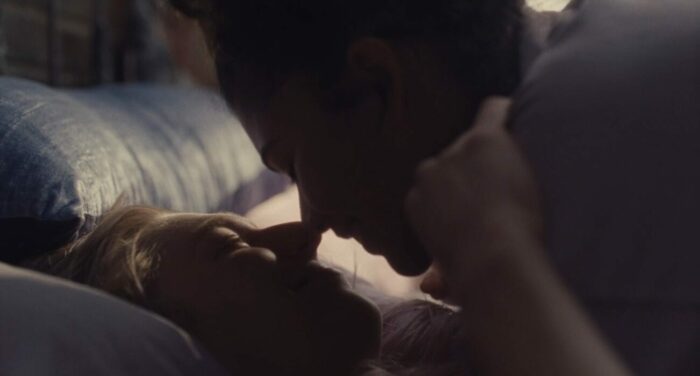
Opening on a beautiful prologue where Rue and Jules are lying in bed enjoying each other’s company during a bliss-soaked honeymoon phase, the two seem happy and hopeful and the sun seems to shine on their every move throughout their apartment. Rue wishes Jules good luck as she leaves to give a presentation on fashion design and the whole scene brings a general sense of happiness. I beamed from one end of my ear to the other, fooling myself into thinking somehow Rue made her way back to Jules and we were about to be given the details to how over the course of the next hour—how naïve I was to suspect this as reality. Euphoria itself only deals in the most fleeting of happy moments. The moment Jules leaves, Rue finds her stash of pills under the mattress, heads into the bathroom, and as she grinds and sniffs the vibrant color of the room shifts to a tonally dampened one where we see a far less happy version of Rue coming off her bump inside a public bathroom.
The rest of the episode is a very stripped-down version of Euphoria, staying in one location to focus on Rue instead of the normal shifting storylines and various locations. Rue approaches a diner booth where her NA sponsor Ali (Coleman Domingo) sits cutting through a double stack of blueberry pancakes. Rue immediately goes into a sales pitch about how she’s doing great and found a good balance, trying to convince Ali that she’s over Jules though continually losing focus. Ali tries to keep her on track and focused on getting clean, knowing fully that she’s trying to sell him on the illusion of her well-being while high at the table there with him. What ensues is an exploration between the difference between adolescence and adulthood. Those themes of thinking everything is imminent and that no one has ever been through what you’re going through versus the experience of having been exactly where someone else has been, being able not to judge that person, and being able to see the bigger picture.
Domingo and Zendaya are both amazing, bringing depth and realism to their characters that not many shows can capably say. As Rue tells Ali she doesn’t want to get clean you can feel the weight of the character, the pain of the things she doesn’t want to face sober. Ali now seems to be facing an uphill battle, but moves with experience alleviating that weight and slowly bringing down the guarded walls Rue has in place by placing those pressures on the disease of addiction. I think it’s the most emboldened a show has ever been on the topic. More often than not when we witness drug addicts in shows and movies they’re presented as bad guys who break hearts, burgle houses, or commit unspeakable acts. I can’t recall a time drug addiction has been so eloquently described by placing a viewer in the addict’s shoes and allowing someone to see how the disease affects an addict’s thought process. Ali describing the disease of addiction is one of the most empathetic and downright frightening accounts, liking an addict’s response to guilt by entombing themselves from the pressures of outside triggers. The difference in Euphoria is the approach comes without the drama of outside perspectives, or victims of addicts, being the most sympathized with but highlighting the need for making people around an addict understand that hurting people closest to them is not the intention of the addict but an effect of the illness.
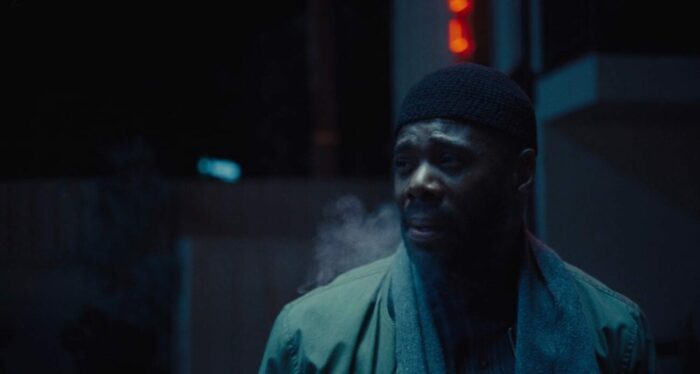
The discussion wades into darker territory with the mention of the second step of NA about putting your faith in a higher power. Ali feels prepared for the argument as Rue meanders through the grace she finds in the ocean or—the argument I wanted to hear more about—Otis Redding’s “Try a Little Tenderness.” Ali feels well equipped with his “God believes you” defense, which sets Rue off as we dive into the catalyst for her addiction: the death of her father. Zendaya leaves it out on the table here, proving the talent that led her to an Emmy win. Battling with why some exploit the reasons they survive situations by crediting God having a purpose for them while her father must not have had a purpose in raising her and her sister. All the credit in the world here goes to Sam Levison for turning this dark viable argument about God and death into an off the rails ride through the mysteries of life, revolutions, and advertising by having it all come together in a brilliant metaphor that Ali relates to Rue for the randomness of life, the thoughtlessness in some people’s actions, what drugs are doing to Rue and why she needs something to believe in if she’s ever going to break her own cycle.
Ali steps out and Rue receives an “I miss you” text from Jules along with a link to Moses Sumney’s song “Me in 20 Years.” You can feel the emotion inside Rue swelling as she sits back in the booth and the camera swoops over her from various angles. Rue’s hand digs into the back of her arm as she slowly cocoons herself into a fetal ball attempting to contain her feelings, watching Ali through the window as he tries to reach out to his children and wish them a Merry Christmas. Ali is met with overwhelming resistance to his gesture and struggles to find the right words with his judgmental daughter as we again get that inside perspective into how an addict’s relationships become hardships of loneliness and disappointment caused by the disease of addiction, leaving Ali with a guilt-ridden conscience. He accepts his non-existence in his youngest daughter’s life and you can sympathize with the man we’ve gotten to know as a father figure to Rue and understand that he is not a bad guy despite his troubled past, though after hearing his story you can also understand the caution of his daughter as well.
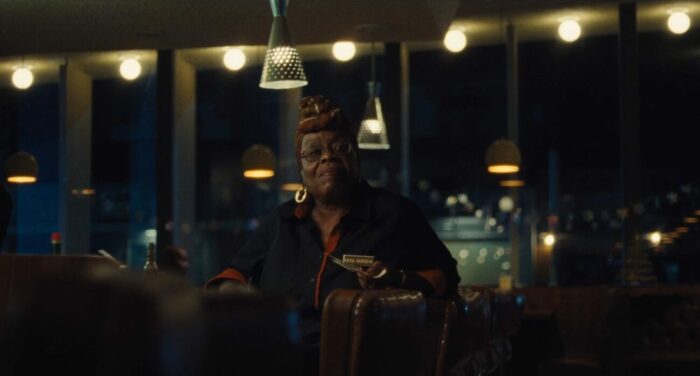
As Ali reenters the booth, Rue immediately asks about what she’s supposed to do about Jules. Her face is sobered by worry, it’s written all over her how much she loves Jules and maybe how much she fears her because she has no idea how she’s supposed to stay clean through an emotional rollercoaster. Ali turns to their waitress, Miss Marsha (Marsha Gambles) and asks her about trying to date in the early stages of her seventeen-years sober. Marsha opens up about wanting that kind of dependency on someone and how what might seem “good to you, ain’t always good for you.” Ali can only tell Rue the same thing so many times, so having him open this up to the only other character we meet in the diner really helps cement his commitment to keeping Rue focused on her sobriety by giving another experienced person a soapbox to speak to their experience with what he already knows. Marsha also gives Rue a piece of advice from her own grandmother that speaks to the wisdom of experience, “Baby, trouble don’t last always,” pointing out that if Rue commits to making changes in her life then she can also avoid the burden of her troubles. I hope we get more stories from Miss Marsha, who had been present in a few episodes of first season but I could see as a source of inspiration and support system if Rue needs to go looking for one, or if Ali should be absent.
Rue begins to get into what the viewers have been waiting for: the night at the train station and the overdose. Rue tells Ali that she still blames Jules for all of the events that caused her to relapse. Ali points out that Rue has already told him that she still had that bag of pills in her room for emergencies, questioning just how committed Rue could have been to her sobriety in the first place. Rue opens up about Jules having cheated on her and Ali speaks to the difference of adult relationships to Rue’s adolescent relationship where things are assumed but not entirely the truth.
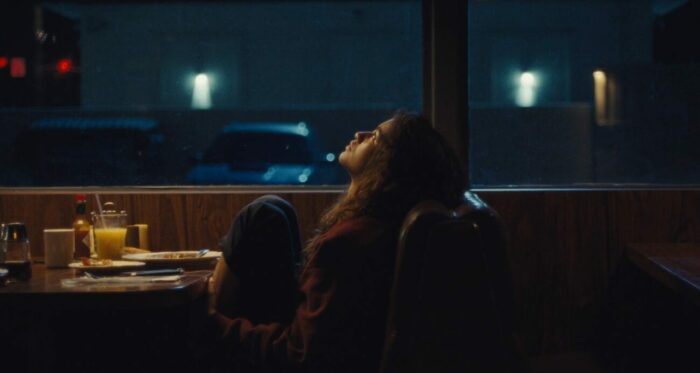
Switching gears, Rue begins speaking to the nature of being “a piece of sh*t,” citing that she punched her mom in the face and threatened to kill her with a piece of glass. Rue calls it an unforgivable act, but what she means is that she will never be able to forgive herself for it. The number of terrible things that Rue has done are heavily weighing on her and her decision to stay intoxicated as a form of escape. Ali has to circle back to that Rue’s actual intentions are not the same as the drug addicted personality that causes Rue to abandon her beliefs when she’s using. Ali speaks to Rue’s accountability but tells her that the hope is in redemption, that the reason that you have so many assholes running around is because no one believes that they can be forgiven so that gives them the right to be vile to one another. The most compelling and hopeful part about this for the viewer is that Ali may be beyond redemption with his daughters, but refuses to give into the Rue philosophy that he is beyond forgiveness even if he’s come to terms with never being forgiven.
Alluding to her proclivity toward suicide, Rue laments how she doesn’t know if she wants to be here anymore. Ali takes it in, continuing to navigate the conversation carefully, asking “Who do you want to be when you leave this Earth?” and “How do you want your Mom and sister to remember you?” Rue answers with “As somebody who tried really hard to be something I couldn’t.” Ali responds with “I have faith in you.” Rue definitely feels it is undeserved but as Ali had pointed out earlier in the conversation about her faith in a higher power, though Rue doesn’t believe she deserves Ali’s faith, Ali continues to believe in her anyway.
The episode fades out with Ali driving Rue home while “Ave Maria” plays over the background noise until the sound of the truck’s wiper blades become the only noise heard as the camera focuses on the visibly exhausted face of Rue distorted by the rain and wipers of the windshield. Something the second half of the episode does extremely well is show Rue’s visible comedown from her brief moment in the bathroom, culminating with this shot at the end of the episode, bookending the character’s highest and lowest states.
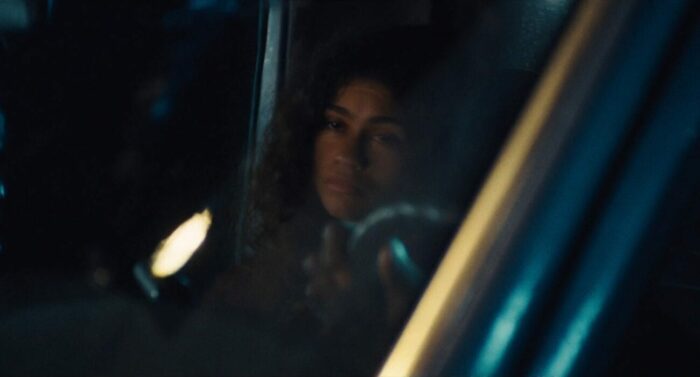
Euphoria’s first special episode grew out of a scene that was supposed to be a short, contained sequence from an upcoming Season 2 episode. Writer and creator Sam Levinson had an idea to make this a full conversation between the two in order to give viewers something in the interim. I don’t want to think of a world where this almost perfect episode almost didn’t exist being that it is so fraught with the discomfort of the dark thoughts and emotions these characters are likely to have in reality. The whole hour flies as if it’s a forgotten part to Linklater’s Before Trilogy, boasting powerful dialogue that provides insight into some of the most captivating television characters in recent memory. No one knows yet what this episode means for the start of Euphoria’s second season, or if it may only be a piece contained within, but there is still one more special episode to go. The second special episode titled “F*ck Anyone Who’s Not A Sea Blob” will be focused on Hunter Schafer’s character Jules, who also co-wrote the episode, and will air on HBO on January 24.

